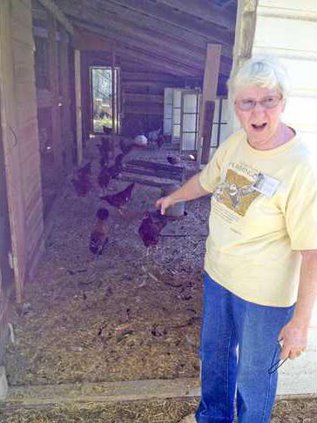The face of tourism in America is changing, with both domestic and international tourists seeking more authentic experiences, explained Cris Collier. The director of the Great Bend Convention and Visitors Bureau recently led a workshop on agritourism for local entrepreneurs at Heartland Farms west of Great Bend.
“They’ve already seen Disneyland, New York City, and Hollywood. Now, they want to dig deeper,” she said. “They want to experience what it’s like to work on a farm, ride a horse in the country, or see the stars on a summer night without the competition from the city skyline.” And the state of Kansas has been encouraging destination marketing organizations throughout the state to lay the groundwork that will bring these travelers here. Recently, Governor Sam Brownback signed an initiative to encourage nature based, non-consumptive tourism in the state, using the 12 Scenic Byways for the jumping off point.
Attendees at the conference learned of the importance of agritourism to the local economy, and how to expand their operations with an eye toward both limiting liability and providing a value added experience for their customers.
Agritourism includes several types of businesses, Collier said, and include roadside stands and farmer’s markets, u-pick operations and tree farms, just to name a few. They can also include agri-education, where people learn about farming and farm life, and agri-tainment, combining the farm setting with fun activities like petting zoos, corn mazes, pumpkin patches, haunted houses and hayrides, and many more ideas, Collier said. Agri-lodging, too, is becoming popular as urban tourists seek authentic experiences. These can be as simple as camping to the more involved dude ranches and country inns and resorts.
Get your story straight
While business plans are important when starting an agritourism business, what may make the difference between a ho-hum attraction and a really great attraction is an interpretive plan for your business, Collier said.
Passing around a rock, she asked participants to describe the rock in one word. Then, she told the story of how she picked up the rock during her last day on an African safari, and what it means to her when she holds it today. Then, passing around the rock again, she asked everyone to describe it again. The responses changed from the tangible, like brown, sharp, and hard, to the intangible like adventure, peace, and cool.
“People want to know the story of a place,” she concluded. “This is how they will value you and help you.”
Recently, members of the Dominican Sisters of Peace who live and operate Heartland Farm worked with Collier to create an interpretive plan which explains their mission. Using the completed plan, she led attendees through the steps, including the initial story gathering. She compared the process to sorting different colored pearls to string into a necklace.
“Every story is a pearl, the sorting is the topics, and the string they are strung on is the theme,” she said.
Interpretive plans could also help an operator to receive grants too. Having their story straight helps to illustrate their mission and purpose, an important part of the grant writing process.
Taking care of needs
Some important considerations often overlooked are the basics, Collier explained. Agritourism attractions need to keep in mind how they will account for the basic needs of their visitors. From offering accurate, easy to follow directions, to having bathrooms and shelter readily available are very important.
“It’s important to remember that some visitors aren’t used to being in a rural environment, and may panic if they can’t determine where they are and where they are going,” Collier said. She related a story of urban visitors lost in the Cheyenne Bottoms Wildlife Area, calling her because they couldn’t find their way out.
“What may seem very obvious to you isn’t always obvious to someone unfamiliar with your area,” she said. “If their basic needs aren’t met, its impossible for them to relax and enjoy the experience, and when they return home, they likely won’t recommend it to their friends.”
Liability
One big issue that has kept many successful farmers and ranchers from adding these sidelines to their business is the fear of liability. This was addressed at length at the conference.
“No state has better laws to limit liability for agritourism operators than Kansas,” Collier said.
But operators need to register their activity with the state, and post warning signs, which can be done for free, and is good for five years. Other common sense steps need to be taken and documented too, in order to show operators have made good faith efforts to keep visitors to their activities safe. Some activities, like lodging and food service, may need additional licensing.
Cooperation is key
In Barton County, there are many smaller attractions, but no major attraction to bring visitors to the area. In order to combat this, Collier has worked on an interpretative plan for the entire Scenic Byway area. A variety of experiences that appeal to a wide variety of travelers has made the Kansas Department of Wildlife, Parks and Tourism take notice. The addition of more agritourism destinations will only make the area stronger, she suggested. More options make the area more appealing to more types of tourists, which only brings more attention from the the state’s office of travel and tourism Collier stressed.
“They know what we have, and they aren’t afraid to send their people here,” she said.
AGRITAINMENT
Putting out the welcome mat for tourists pays off





